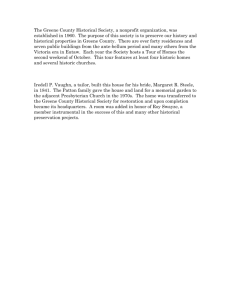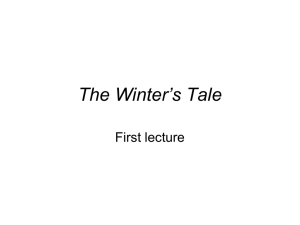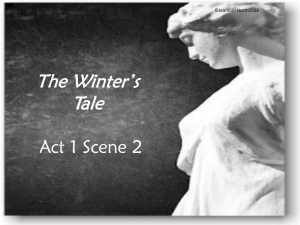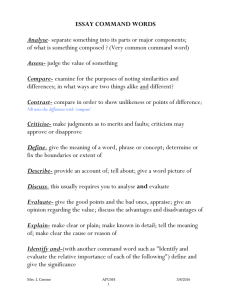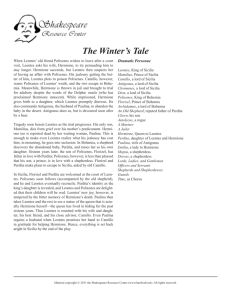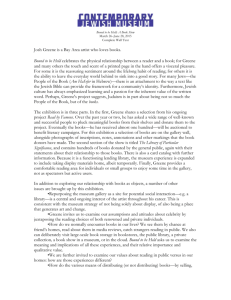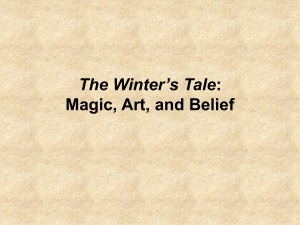Trifle and the Presence of Robert Greene in
advertisement
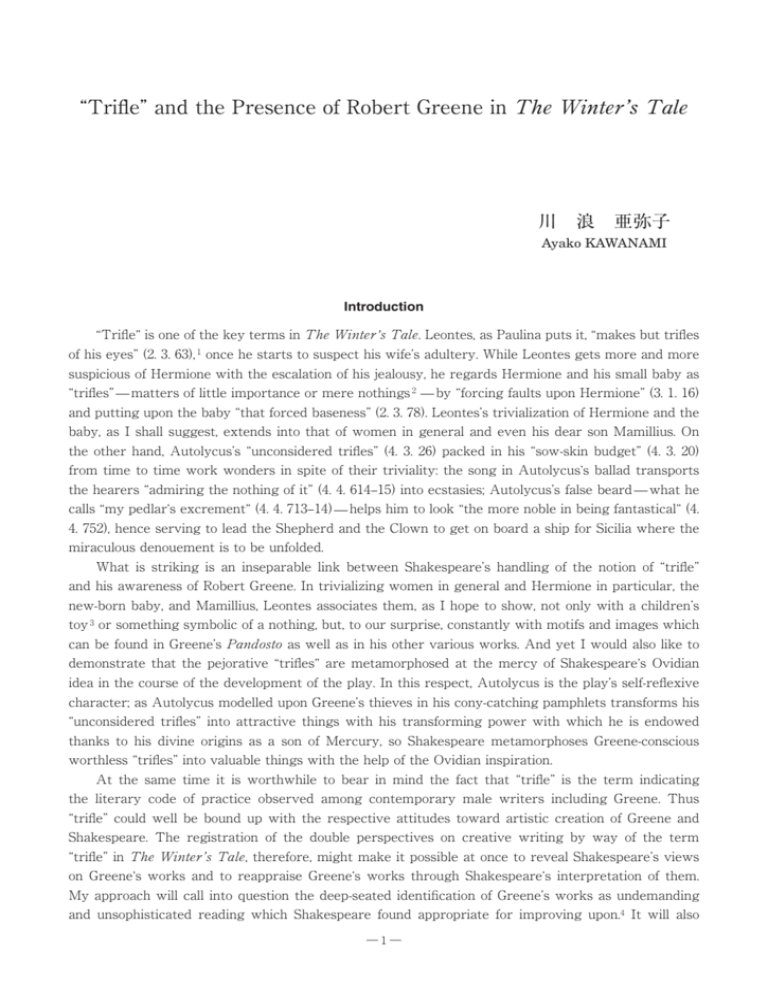
弘前学院大学文学部紀要 第49号(2013) Trifle and the Presence of Robert Greene in 川 浪 亜弥子 Ayako KAWANAMI Introduction Trifle is one of the key terms in . Leontes, as Paulina puts it, makes but trifles of his eyes (2. 3. 63), 1 once he starts to suspect his wife s adultery. While Leontes gets more and more suspicious of Hermione with the escalation of his jealousy, he regards Hermione and his small baby as trifles ̶ matters of little importance or mere nothings 2 ̶ by forcing faults upon Hermione (3. 1. 16) and putting upon the baby that forced baseness (2. 3. 78). Leontes s trivialization of Hermione and the baby, as I shall suggest, extends into that of women in general and even his dear son Mamillius. On the other hand, Autolycus s unconsidered trifles (4. 3. 26) packed in his sow-skin budget (4. 3. 20) from time to time work wonders in spite of their triviality: the song in Autolycus s ballad transports the hearers admiring the nothing of it (4. 4. 614‒15) into ecstasies; Autolycus s false beard ̶ what he calls my pedlar s excrement (4. 4. 713‒14) ̶ helps him to look the more noble in being fantastical (4. 4. 752), hence serving to lead the Shepherd and the Clown to get on board a ship for Sicilia where the miraculous denouement is to be unfolded. What is striking is an inseparable link between Shakespeare s handling of the notion of trifle and his awareness of Robert Greene. In trivializing women in general and Hermione in particular, the new-born baby, and Mamillius, Leontes associates them, as I hope to show, not only with a children s toy 3 or something symbolic of a nothing, but, to our surprise, constantly with motifs and images which can be found in Greene s as well as in his other various works. And yet I would also like to demonstrate that the pejorative trifles are metamorphosed at the mercy of Shakespeare s Ovidian idea in the course of the development of the play. In this respect, Autolycus is the play s self-reflexive character; as Autolycus modelled upon Greene s thieves in his cony-catching pamphlets transforms his unconsidered trifles into attractive things with his transforming power with which he is endowed thanks to his divine origins as a son of Mercury, so Shakespeare metamorphoses Greene-conscious worthless trifles into valuable things with the help of the Ovidian inspiration. At the same time it is worthwhile to bear in mind the fact that trifle is the term indicating the literary code of practice observed among contemporary male writers including Greene. Thus trifle could well be bound up with the respective attitudes toward artistic creation of Greene and Shakespeare. The registration of the double perspectives on creative writing by way of the term trifle in , therefore, might make it possible at once to reveal Shakespeare s views on Greene s works and to reappraise Greene s works through Shakespeare s interpretation of them. My approach will call into question the deep-seated identification of Greene s works as undemanding and unsophisticated reading which Shakespeare found appropriate for improving upon.4 It will also ―1― Trifle and the Presence of Robert Greene in refute the conventional view concerning the relation of Shakespeare to Greene ̶ namely, that Greene was beyond the pale in the face of Shakespeare s brilliant imagination ̶ which has been vehemently reasserted by Stephen Greenblatt in his biography of Shakespeare, with an ironical remark that Greene was an untalented yet vainglorious hack writer, who making everyone laugh with zany stories of conycatching, was confident, in all likelihood, that Shakespeare was a coney to be caught. 5 I Let us begin by taking a look at Leontes s trivialization of Hermione. When Leontes is convinced that Hermione is an adulteress, he deepens his resentment against her with the accretion of disdainful epithets like The shrug, the hum or ha (2. 1. 71), O thou thing ( l. 82), and A bed-swerver ( l. 93). In the following lines of Leontes are included a few more contemptuous phrases for Hermione which fit our present purpose: My wife s a hobby-horse, deserves a name As rank as any flax-wench that puts to Before her troth-plight: (1. 2. 276‒78) The epithet of hobby-horse serves to make Hermione worthless in a double sense. In the sense of prostitute, a hobby-horse suggests a woman of no import having no sense of chastity; whereas, to be more notable, a hobby-horse signifies a valueless toy horse which children play with.6 In terms of Leontes s negation of Hermione as a mere nothing, O thou thing could well be also a contributory phrase in its allusion to a cipher (zero). In order to inflate his image of Hermione as a lustful woman, and therefore a mere nothing, Leontes turns to Greene s works at the same time. Presumably Leontes derives the idea flax-wench from the passage it [is] hard to put fire and flaxe together without burning in Greene s , 7 where Pandosto muses over the possibility of a sexual liaison between Egistus and Bellaria (the equivalents of Polixenes and Hermione). In effect, Greene does not make a clear identification of either fire with Egistus nor flaxe with Bellaria. Regardless of this, Leontes still evokes Greene to confirm his association of Hermione s sexuality with the vigorous characteristic of flax which burns up in a flame if it should by any chance catch a fire. Furthermore, a flax-wench might be related to a Flaxe wife in A Pleasant Discovery of the Coosenage of Colliers, one episode in Greene s cony-catching pamphlets. It is a story about a deceitful collier who tries to play a hoax on his customer a Flaxe wife by filling his sacks with plenty of dregs instead of genuine coals. By way of a much stronger attraction, the story focuses on a retaliatory measure of a Flaxe wife against his fraud. In complicity with the housewives in her neibourhood ̶ shrews, in the collier s terms ̶ she puts him on mock trial. One jolly Dame is chosen as the Judge by a unanimous vote and a Flaxe wife is summoned to appear as a witness to give evidence for his treachery, while each of other housewives surrounds him with a good cudgell under her apron. The collier is thus tried by the verdict of the smock. 8 A Flaxe wife in this episode is presented as the epitome of a scolding and turbulent woman with unruly tongue. With the help of such words as apron and smock, a Flaxe wife is also characterized as representative of ordinary women, and it is by means of her commonality that the authoritative atmosphere of a serious court scene is ―2― 弘前学院大学文学部紀要 第49号(2013) mocked and changed into an amusing one. For Leontes who firmly believes Hermione s adultery, her behaviour is all the more abominable because it makes him think of women s unmanageable tongue ( women say so, / [That will say any thing] (1. 2. 130‒31)) and her annihilation of the class boundary, a demarcating line between the authoritative and the subordinate ( O thou thing ̶ / Which I ll not call a creature of thy place, / Lest barbarism, making me the precedent, / Should a like language use to all degrees, / And mannerly distinguishment leave out / Betwixt the prince and beggar (2. 1. 82‒87).9 So, for Leontes to evoke vigorous sexuality, unrestrained tongue, and class degradation by means of the term flax-wench is equal to his calling forth of Greene. Leontes s distrust of Hermione leads to his castigation of the whole women especially in terms of their falseness in both sexual behavior and glib talks. In so doing, Leontes yet again makes us remind of Greene s characters: But were they false As o er-dy d blacks, as wind, as waters, false As dice are to be wish d by one that fixes No bourn twixt his and mine, yet were it true To say this boy were like me. (1. 2. 131‒35) Dice, by its link with games of chance, being a symbol of unreliability and thirst for monetary gain, such a flirtatious woman that fixes / No burne twixt his and mine in pursuit of dice serves as an immediate reminder of a prostitute. Autolycus bears testimony to a link between dice and prostitutes: With die and drab I purchas d this caparison (4. 3. 26‒27) ̶ he lives on games of chance ( die ) and prostitutes ( drab ). Since Autolycus is a character that springs from Greene s cony-catching pamphlets in which are included some stories about cony-catchers stealing money in concert with whores, it would not be difficult to connect Leontes s one that fixes / No burn twixt his and mine with Greene s prostitutes. Once Leontes assures himself that the whole women are false and therefore trivial, he pours his contempt upon Paulina as well, not just Hermione alone. Leontes calls Paulina by such names as A mankind witch (2. 3. 68), A most intelligencing bawd (l. 69), dame Partlet (l. 75), crone (l. 76), A callat / Of boundless tongue (ll. 90‒91), A gross hag (l. 107), and Lady Margery (l. 159). Crone in particular is a Greene-related title. In Greene s , the whore Nan tells a story about an old Croane to prove how whores (female cony-catchers) can steal money more ingeniously than thieves (male cony-catchers). An old Croane is an experienced whore who exercises and maintains the profession of prostitution, employing the gift of gab to her best advantage. She saves her daughter at a crisis of her prostitution career because of her unexpected pregnancy in such a way that she lay in childbed as though shee had been delivered, and said that childe was hers, and so saved her daughters scape. 10 To associate Paulina with Greene s old Croane might be the smartest way for accusing her of lewdness and unrestrained tongue. Although Leontes admits that the baby s fate for having no father is ascribed to Hermione s offence rather than to its own ̶ No father owning it (which is, indeed, / More criminal in thee than it) (3. 2. 88‒89), he treats it harshly to such a degree that he trivializes it. When in her mother s womb, the baby is considered to be a mere thing, a strange and worthless thing. Leontes, breaking into a room where Mamillius and Hermione enjoy their playful conversation, orders his lords to take away his boy and goes ―3― Trifle and the Presence of Robert Greene in on to tell them to let her sport herself With that she s big with; for tis Polixenes Hath made thee swell thus. (2. 1. 60‒62) Leontes s thoroughly distant attitude toward Hermione s pregnancy is successful in creating an impression that Hermione s body is getting big by itself where he has nothing to do with it. In the very act of drawing attention to the growth of the baby in the womb of Hermione, Leontes completely empties it out. The emptiness and worthlessness of the baby is stressed by his identification of it with something for fun ̶ a toy which Hermione manipulates to amuse herself. Prior to this scene, moreover, the waiting-ladies have described Hermione s pregnant body with expressions that are prone to contribute to Leontes s created image of the baby as being empty and worthless: The queen . . . rounds apace (2. 1. 16), and She is spread of late / Into a goodly bulk (ll. 20‒21). When Leontes disgustedly points at the swelled and round body of Hermione, therefore, he might well indicate that it is a cipher. After the baby comes into the world out of Hermione s womb, Leontes calls her a bastard in most cases yet brat three times ̶ This brat is none of mine (2. 3. 92), what will you adventure / To save this brat s life? (ll. 161‒62), and Thy brat hath been cast out, like to itself (3. 2. 89). Leontes applies the term brat to the baby, following the example of Pandosto, but it is also taken from the mouth of the shepherd s wife Mopsa in . When Porrus, her husband shepherd, brings back home the newly- found baby, Mopsa, being somewhat jelousse, yet marveiling that her husband should be so wanton abroad, . . . and taking up a cudgel . . . sware solemnly that shee would make clubs trumps, if hee brought any bastard brat within her dores. 11 In the light of this context, her way of using the term brat does not necessarily show her disdain for the baby; but it rather betokens either her humorousness or her vulgarity. And so it is that Leontes s choice of brat for the baby could well defeat his serious purpose of trivializing her with its implied amusement. The reason for Leontes s adopting this term in spite of the danger of undermining his real intent perhaps lies in his attempt to add the sense of triviality by taking it from the mouth of a mean female character, especially one from Greene s works. Leontes forces his baby Perdita to be or none or little (3. 2. 192), as Paulina declares, by regarding her as a trifle and conjuring up Greene at once. As for Mamillius, Leontes s attitude toward him is ambiguous because his imaginary vision of Hermione s adultery disturbs his affection for him. So, while being consoled by the resemblance between himself and his son, Leontes nevertheless resorts to repeatedly ask Mamillius anxious questions as if to ascertain its validity ̶ Art thou my boy? (1. 2. 120), Art thou my calf? (l. 127), and How now, boy? (l. 207). It has been often discussed that Leontes s way of addressing Mamillius in Act 1, Scene 2 offers a glimpse of male conflicts in terms of the construction of masculine identity in the Renaissance. At a certain point in their lives boys have to undergo a transition from boyhood to adulthood by leaving behind their intimate contact with their mother and nurses and establishing themselves as men. The transition, which, from the psychoanalytical point of view, is called that from symbiosis to individuation, was marked by the social customs of cloth breeching and of sending boys to school to learn Latin ̶ a male puberty rite, as Walter Ong suggests it ̶ in the Elizabethan society where gender differentiation was taken for granted.12 However, the transition from boyhood to adulthood, as is ―4― 弘前学院大学文学部紀要 第49号(2013) discussed, is neither clear-cut nor straightforward; instead, men continue to feel anxiety over the loss of childhood innocence and effeminateness even after they are urged to perform their male role at society. Thus, Leontes s act of recollecting his boyhood, stimulated by the figure of Mamillius being unbreech d in his green velvet coat (1. 2. 155‒56), is a symptom of the very anxiety. But it seems to me that Leontes s disoriented mood during his staying together with Mamillius does not shed light on the universal trait of male consciousness; rather, it might well foreground Leontes s particular tragedy of a downward spiral of suspicion. I would like to suggest that this brief scene of the communication between Leontes and Mamillius could be considered to function as a comment on the phase of Leontes s continual act of making but trifles of his eyes. With Mamillius s positive answer to his initial question Art thou my boy? Leontes is at first somewhat relieved ̶ Why that s my bawcock (1. 2. 121); he convinces himself that Mamillius is his own son, both being the counterparts of each other ( They say it is a copy out of mine [l. 122]). Yet his satisfaction is immediately followed by his anxiety over their difference derived from the fact that Mamillius has smudged his nose (l. 121) and from the developing image of calf ̶ Thou want st a rough pash and the shoots that I have / To be full like me (ll. 128‒29). But there is yet another twist on Leontes s mood: yet they say we are / Almost as like as eggs (ll. 129‒30). And once again Leontes s somewhat comforted mind suddenly changes its direction for disbelief, as soon as Leontes starts to question the credibility of women s words, the source of the knowledge of their resemblance ̶ yet were it true / To say this boy were like me (l. 135). In the course of the restless change of mind, Leontes definitely deepens his suspicion of the illegitimacy of his son ̶ therefore trivializes him ̶ undergoing the repeated processes of hope being faded by disbelief in a moment. The downward process is very well exemplified by his words they say we are / Almost as like as eggs : Leontes is lulled into a sense of security by the two-eggs-like similarity between himself and his son, yet his ease of mind is simultaneously undermined by the symbolical image of a cipher, evoked by the oval shape of an egg. The scene where Leontes nostalgically harks back to his early years, looking at Mamillius, could well be part of the run of ups and downs in the disoriented change of his mind: Looking on the lines Of my boy s face, methoughts I did recoil Twenty-three years, and saw myself unbreech d In my green velvet coat; my dagger muzzl d Lest it should bite its master, and so prove, As ornaments oft do, too dangerous: How like, methought, I then was to this kernel, This squash, this gentleman. Mine honest friend, Will you take eggs for money? (1. 2. 153‒61) How tender and affectionate Leontes appears on this particular occasion for recalling his own figure in his infancy through that of Mamillius! Leontes s repetition of how he was like Mamillius ( How like, . . . I then was to this kernel / This squash, this gentleman ) seems to strengthen his endearing feeling for both his tender self and his son. But there is an undertone of aloofness in Leontes s words, the culmination of which comes with his question Will you take eggs for money? : Mamillius might prove himself to be good-for-nothing by taking, instead of money, eggs ̶ worthless things in relation ―5― Trifle and the Presence of Robert Greene in to their notably associated image of a cipher. Such a doubt makes Leontes direct the abrupt question at Mamillius. The underlying sustained movement toward trivializing Mamillius is accentuated by the association of him with Greene. Although psychoanalytically-oriented critics have pointed out that the (meaning breast or pap ),13 etymological root of the name of Mamillius is the Latin word it should be noted that it is the masculine form of the name of the female protagonist in Greene s first romance . The masculinization of Greene s Mamillia could be helpful for creating a sense of detachment from Greene s work; yet the name of Mamillius always harbors its tendency toward effeminateness and worthlessness because of his potential connection with a female and Greene. Thus, Leontes needs to take away Mamillius from the hands of Hermione ̶ and Greene implicitly, saying Though he does bear some signs of me, yet you / Have too much blood in him (2. 1. 57‒58). Additionally, the appearance of Mamillius being unbreech d in his green velvet coat serves as a stark reminder of Greene. In , Greene presents a debate between Cloth breeches and Velvet breeches over which is entitled to live in England. Greene, who ostensibly prefers the sober and simple way of life of an old English yeoman Cloth breeches to the gay and prodigal way of life of an Italionate upstart Velvet breeches, settles their dispute by siding with Cloth breeches. Whereas green and velvet are alluding to Greene, unbreech d could well be intended to make a mockery of Greene s pamphlet which apparently exhorts the reader to live a simple and unexciting life. Mamillius s tale beginning with such an old familiar phrase as There was a man ̶ / . . . Dwelt by a churchyard (2. 1. 29‒30), a symbol of the close contact between Mamillius and his mother as he whispers it in her ear, might well be also dismissed by Leontes as a trifle ; for, in sharp contrast to Hermione who shows her willingness to listen to her boy s tale by saying Come on, sit down, come on, and do your best / To fright me with your sprites (2. 1. 27‒28), Leontes breaks in and replaces it with his serious matters. Taking this into account, Leontes could well disregard Greene s as well, which is composed of such old familiar themes as the disruption of a family, a shipwreck, the recovery of the lost child by means of identity tokens, the fulfillment of an oracle, and the eventual happy reunion of the family. The inference can be deduced from the fact that Leontes makes little of the oracle, virtually rejecting it as a trifle ̶ what defines as a lying story, or a false tale told to deceive ( trifle, sb. 1), as he declares that There is no truth at all i th Oracle: . . . this is mere falsehood (3. 2. 140‒41). Leontes concedes that the oracle belongs to such people that believe things with their ignorant credulity (2. 1. 192). For Leontes who believes himself to be well versed in truth thanks to his rational thoughts, it is unnecessary to turn to the oracle; yet he accepts access to it since, according to what he says, it will enable ignorant people to Come up to th truth (l. 193). Meanwhile, the title page of says thus: Pandosto. The Triumph of Time. Wherein is discovered by a pleasant Historie, that although by the meanes of sinister fortune, Truth may be concealed yet by Time in spight of fortune it is most manifestly revealed. Its Latin motto is the summary, the reader of . As is indicated in comes up to the truth in the course of the gradual unfolding of the oracle which goes hand in hand with the passing of time. It therefore follows that the enthusiastic reader of are those of an ignorant sort. As the oracle is despised for its mere falsehood, so Greene s which relies for its main attractiveness on the involvement of the oracle could be regarded as a false story, that is to say, a trifle. ―6― 弘前学院大学文学部紀要 第49号(2013) II All the same, Shakespeare aims not to castigate and leave behind Greene in complicity with Leontes; rather, the task which Shakespeare sets before himself is to rescue Greene from the heavy burden of the stigma of trifle. In so doing, Shakespeare makes the Ovidian idea of metamorphosis at full play. has been recognized as Shakespeare s purposefully Ovidian play with obvious allusions to the Ovidian myths of Proserpina and Pygmalion. But I would like to suggest here an echo of Pythagorean metempsychosis, not the least Pythagorean theory of numbers in the fifteenth book of Ovid s . Pythagoras is the first man to propose living on vegetation; he teaches people not to kill beasts by shedding their blood nor put the flesh of slaughtered animals on the table. It is the idea of metempsychosis which props up Pythagoras s philosophy: 14 ̶ the soul always remains selfsame, yet it turns into various figures. Pythagoras thus ponders over a variety of things in a state of flux, raging from environmental changes of time, seasons, elements, rivers, lands to biological ones of plants, beasts, and human beings. Pythagoras himself has come into being, undergoing a change out of Euphorbus at the time of the Trojan War. Of the alteration of the bodies of human beings, for example, Pythagoras says in this way, comparing it to our life cycle: ̶ in Golding s translation, Our bodies also ay / Doo alter still from tyme to tyme, and never stand at stay. / Wee shall not bee the same wee were today or yesterday. 15 The literal meaning of the passage should be that our bodies are in such a state of flux that what we have been or we are is different to what we will be tomorrow. In view of the simultaneous events of the maintenance of the soul and everlasting changes in Pythagorean metempsychosis, however, the passage should betoken the implied message that the essence of our souls is preserved, no matter how different we are in appearance between yesterday, today, and tomorrow. And it is highly possible that Shakespeare, who has grasped the essence of Pythagorean philosophy, gives voice to the hidden message with Polixenes s ideal theme of being eternally boys: We were, fair queen, Two lads that thought there was no more behind, But such a day tomorrow as today, And to be boy eternal. (1. 2. 62‒65) This speech is about the sustained maintenance of children s innocent minds having no difference between what they are today and what they will be tomorrow. Shakespeare s use of such words as today and tomorrow could indicate that he refers for the composition of this speech to both Ovid s original text and Golding s translation. This is nothing but a hint at Shakespeare s awareness of Pythagorean metempsychosis on account of relatively tentative evidence of his oblique and not straightforward reference to one passage from Ovid s . But Shakespeare s further interest can be attested by his appropriation of an idea of numbers which is implicitly registered in the philosophy of Pythagoras. In the course of the speech of Pythagoras, there is recurrent articulation of the core idea that all things are changing their shapes variously while maintaining their spirits everlastingly. I am going to ―7― Trifle and the Presence of Robert Greene in quote below both the passages in Ovid s Latin original and Golding s translation from different parts in the story of Pythagoras. They are worth considering side by side because they respectively refer to the crux of Pythagorean metempsychosis although their expressions are quite contrary, and because they share key words of numbers although their connotations are totally antithetical: , And though that varyably Things passe perchaunce from place to place: yit all from whence they came Returning, do unperrisshed continew still the same. But as for in one shape, bee sure that nothing long can last.16 ( nothing dies ) and Golding s nothing long There is a stark contrast between Ovid s can last. Especially in terms of the description of one soul, there is a remarkable opposition between Ovid and Golding: whereas Ovid relates the tale of the imperishable soul with ( is a derivative of meaning one ), in Golding s translation, one soul will be perishable. Since these two disparate passages point to the common theme, however, the idea that one soul can betoken infinity and a cipher at once could well be considered constitutive of the theory of Pythagorean metempsychosis. The Ovidian numerical idea of whether a cipher or infinity can be traced at several places in . The best example can be found in Polixenes s speech at the moment of his intending to leave the Sicilian court. Polixenes expresses his many thanks for Leontes s bountiful hospitality with the help of the term cipher with rich nuance: Nine changes of the wat ry star hath been The shepherd s note since we have left our throne Without a burden. Time as long again Would be fill d up, my brother, with our thanks, And yet we should, for perpetuity, Go hence in debt. And therefore, like a cipher (Yet standing in rich place), I multiply With one We thank you many thousands more That go before it. (1. 2. 1‒9) A cipher, an arithmetical symbol of 0 (zero), is of no value by itself and betokens nothing, but it would be able to produce infinity thanks to its uniquely flexible characteristics of either increasing or decreasing the value of other figures depending on its position. Polixenes capitalizes on the idea of the numerical metamorphosis of cipher because of his lack of proper words to express his thanks. Although his one We thank you cannot but serve as a mere nothing in consideration of Leontes s bountiful kindness, Polixenes wishes it multiplied into many thousands more in the same manner as a cipher is metamorphosed into infinity. The following speech of Hermione is based on the same Ovidian numerical lines, too. Having been ―8― 弘前学院大学文学部紀要 第49号(2013) disturbed by Hermione s success at persuading Polixenes to stay longer, Leontes makes an ambiguous suggestion that she speaks for useful purposes only once prior to the present one. Hermione urges Leontes to tell about the previous one with his rich words of praise. For she thinks: one good deed, dying tongueless, Slaughters a thousand, waiting upon that. Our praises are our wages. You may ride s With one soft kiss a thousand furlongs ere With spur we heat an acre. (1. 2. 92‒96) Hermione is well aware of two possible fates of one good deed. One good deed is contingent upon its reward; one deed will be turned into a thousand if it receives a plenty of praise on the one hand, one deed will end up dying as a mere nothing if it receives no praise on the other. The idea of whether infinity or a cipher is further emphasized in her metaphor of horse-riding. Whether horses can do a respectable job of running a thousand furlongs or a worthless job of heating an acre entirely depends on what they receive, either one soft kiss or spur. III The echo of the double-edged nature of the Ovidian numerical idea being acknowledged, trifles, by means of which Leontes has called forth the meanings of a cipher, nothing, and worthlessness, have chances to work another way round. In the presence of the solemn voice of the oracle, for instance, Cleomenes grasps something precious: But of all, the burst / And the ear-deaf ning voice o th oracle, / Kin to Jove s thunder, so surpris d my sense, / That I was nothing (3. 1. 8‒11). Dion is also struck by the divinity of the oracle and says: when the Oracle / (Thus by Apollo s great divine seal d up) / Shall the contents discover, something rare / Even then will rush to knowledge (ll. 18‒21). It can be surmised from the experience of both Cleomenes and Dion that the oracle effects nothing, yet the nothing is not a mere nothing but something rare. Perdita who has been condemn d to loss (2. 3. 191) brings about a wonder for the family of a most homely shepherd, a man who, from very nothing, and beyond the imagination of his neighbours, is grown into an unspeakable estate (4. 2. 39‒41). When the first encounter between Perdita and Leontes in sixteen years is reported in the final Act, it is described as a moment when the loss of Perdita forced by Leontes is metamorphosed into Leontes s loss of words for joy: Our king, being ready to leap out of himself for joy of his found daughter, as if that joy were now become a loss, cries, O, thy mother, thy mother ! (5. 2. 50‒53). With respect to each one of these instances there is an implication that nothing is metamorphosed from zero to infinity. As far as the connotation of the word loss is concerned, it is shifted from nought to plenitude. And yet this shift counts only in remembrance of its nothingness as Leontes s wonder is expressed with O, the figure of a cipher. As I have shown, the escalation of Leontes s jealousy is indicated by his act of making trifles one after another, the trivialized images of women, children, and Greene. The next speech of Leontes is the very epitome of the whole texture of Leontes s story by way of weaving the threads of trifle. His tale knitted by the threads of trifle is just like a dream based upon his delusion: ―9― Trifle and the Presence of Robert Greene in Affection! Thy intention stabs the centre: Thou dost make possible things not so held, Communicat st with dreams; ̶ how can this be? ̶ With what s unreal thou coactive art, And fellow st nothing: then tis very credent Thou may st co-join with something; and thou dost, (And that beyond commission) and I find it, (And that to the infection of my brains And hard ning of my brows). (1. 2. 138‒46) This ambiguous and paralyzed language sounds as if he were saying: O, you, affection ̶ infection of the conception of lust! By stabbing the core of my soul, your intensity inspires my imagination, making impossible things possible, as dreams do. While working together with the unreal nature of dreams, you are associated with trifles ̶ worthless things like children, women, and Greene s stories, and it is then very likely that you may produce something. I find it, a thing which is demonstrated by my cuckold s horns. Leontes thus has a dream of a salacious story. Convinced by the logic of his dream, Leontes envisions Hermione s lustful life: Your actions are my dreams. / You had a bastard by Polixenes, / I but dream d it! (3. 2. 82‒84). But Leontes s story could be interpreted in a different way by virtue of the metamorphic nature of trifles. Hence his words could be rewritten thus: O, you, affection ̶ childhood innocence! (Camillo mentions it in his They were trained together in their childhoods, and there rooted betwixt them then such an affection (1. 1. 22‒23), a nostalgic description of the children s days of Leontes and Polixenes.) By stabbing the core of my soul, your intensity inspires my imagination, making impossible things possible, as dreams do. While working together with the unreal nature of dreams, you are associated with a variety of trifles ̶ children, women, and Greene s stories, and it is then very likely that you may produce something rare and precious. I find it, a thing which makes me identified as unimaginative and simple-minded with the recognition of the hardening of my head. Antigonus s dream is the apotheosis of the dream which is constructed by weaving the threads of trifle in its positive sense. It is the dream which Antigonus sees the night before he dies eaten by a bear: Come, poor babe: I have heard, but not believ d, the spirits o th dead May walk again: if such thing be, thy mother Appear d to me last night; for ne er was dream So like a waking. . . . Affrighted much, I did in time collect myself, and thought This was so, and no slumber. Dreams are toys: Yet for this once, yea, superstitiously, I will be square d by this. (3. 3. 15‒41) Antigonus s dream is akin to Mamillius s old tale in that the two stories equally about insubstantial yet frightening things like spirits, sprites, and goblins contain elements of sensation. Antigonus s dream ― 10 ― 弘前学院大学文学部紀要 第49号(2013) hovering between sleep and awakening also reminds us of a series of events reported by gentlemen in Act 5, Scene 2, a story hovering between truth and suspicion; that is to say, an old tale, therefore a trifle, as the gentlemen punctuate their messages with the very phrase ̶ This news, . . . is so like an old tale (ll. 27‒28) and Like an old tale still (l. 62). As it happens, Antigonus designates his dream as a toy. Although Antigonus usually tends to dismiss dreams as toys or mere nothings, he nevertheless allows himself to be directed by this dream. Antigonus has been caught up in the ambiguous attraction of a toy or trifle which is worthless yet precious. IV Thus far, I have delineated the discursive implication of trifle under the control of Shakespeare s brilliant imagination. For the rest of this paper, I would like to suggest the further complexity of trifle by introducing the concept of the contemporary literary habit of designating written works as trifles or toys. What I mean is that Leontes s act of associating women and children with trifles and toys is a reflection of Greene s literary practice of calling his works trifles or toys. My suggestion could work mainly for two purposes: firstly, it will make firm the connection between the term trifle and Greene which I have elucidated so far; secondly, it will bring into central focus, due to the term s implication in gender and class dynamics, the hidden association between trifle and the social concerns of gender and class, which has led to Leontes s act of trivialization. It has been widely acknowledged that many Renaissance writers had adopted the modest stance toward their own works by calling them their mere trifles or toys. In his dedicatory epistle To My Dear Lady And Sister The Countess of Pembroke attached to , Sidney says, for severer eyes it is not, being but a trifle, and that triflingly handled. Sidney then goes on to ask his sister to [look] for no better stuff than, as in a haberdasher s shop, glasses or feathers. 17 In his preface to female readers, likewise, John Lyly identifies his romance as being but a toy, as lawn on your heads, being but trash. Lyly recommends them to read it at relaxing times when they play with their toys: It resteth, Ladies, that you take the pains to read it, but at such times as you spend in playing with your little dogs; . . . Or handle him as you do your junkets. 18 When Greene started writing in the shadow of Lyly s romances, he imitated not only the Euphuistic style but also the literary habit of calling works trifles or toys. Greene describes many of his pamphlets as his toys/trifles : he calls my toy and asks the patron of to cast a glance at this toy. In his repentance pamphlet , Greene puts himself on the table for a debate between Gower and Chaucer about whether Greene had doone well or ill, in setting foorth such amorous trifles. 19 Thus, Greene was quite willing to characterize his amorous pamphlets as trifles or toys. Given this background, Leontes s connecting Hermione with a hobby-horse and the baby with Hermione s toy could be considered an allusion to contemporary writers habit of likening their works to such trifling things as glasses, feathers, little dogs, and junkets. In particular, since Leontes is a character virtually coming from Greene s , his act of treating the cherished members of his family as trifles / toys could well refer to the figure of Greene naming his cherished works trifles / toys. Through the same association, when Hermione says to Leontes, How will this grieve you, / When you shall come to clearer knowledge, that / You thus have publish d me! (2. 1. 96‒98), it sounds as if she were implying Greene s way of publishing his works with the deliberate remarks of trifles or toys. ― 11 ― Trifle and the Presence of Robert Greene in As is suggested by Hermione s warning and the degree of cruelty in Leontes s act of trivialization, there is a disturbing subtext in the literary habit of calling works trifles or toys. Indeed, Juliet Fleming sees the mechanism of what she calls the ladies text functioning behind this literary habit. In paying attention to male writers ostensibly modest attitude in presenting to female readers their love poems and love romances under the name of trifle or toy, Fleming reads a paradoxical enactment of a gendered ritual of praising their superiority and self-esteem, as opposed to women s simplicity represented by their tastes for trivial things. 20 Lori Humphrey Newcomb insists on the articulation of class as well as gender concerns in the adoption of trifle / toy on the part of elite male writers like Sidney, Lyly, and Greene. So, Newcomb argues that [w]hen Greene and Sidney dismissed their works as toys and trifles, they actually recommended them for circulation among valued coterie members or customers, under cover of keeping them exclusive to a circle of female intimates. In Newcomb s opinion, however, the sense of exclusivity in terms of both class and gender with which elite male writers had provided their works gradually receded in the case of Greene s works as print enabled works to reach such a wider audience as nonelite and female readers. With their entertainment works no longer exclusive because of the diversifying effect of print, elite male writers revised old prejudices against the illiteracy of the non-elite and the ignorance of the female into new ones against their simple tastes for reading matters and, for that matter, they marked Greene s romances, especially Greene s steady-selling romance , as proper to the simple and popular tastes of non-elite and female (1592), [Greene] was a daintie slave to content the taile of a readers: Nashe wrote in (1599), the court Tearme, and stuffe Serving mens pockets ; in Jonson s lady Saviolina is described by Carlo Buffone as using choice figures in her ordinary conferences as well as any in Overbury s works, whence she may steale with more security ; in the sixth edition of Thomas in 1615, a typical Chamber-maide is characterized as one who reads works over and over. Against the dominant critical trend to link Greene s works with unsophisticated readership on the grounds of these accounts, Newcomb asserts that the connection between female readers or men and women in service and Greene was a product of the elites purposeful manipulations in drawing class boundaries. In the ongoing movement of identifying Greene s works as reading matters for popular tastes, Newcomb suggests, Autolycus s introduction of Greene s played a significant role by way of in its reduced form of a ballad which a new literate clown appreciates and a credulous woman Mopsa makes a fetish of. 21 But Shakespeare s inclusion of the complicated nuance of trifle in could afford a new perspective on Greene s trifles. With trifles simultaneously referring to the figure of Greene as an elite writer calling his own work a trifle / toy and the figure of Greene discounted as a popular writer for simple people like women and children, Shakespeare implies that Greene s works were from the beginning written for both the elite and the non-elite or female. This is stressed by both the presence of the two indistinguishable implications of nothing or trifles in Leontes s speech and Shakespeare s presentation of trifle with O, a symbol for being nothing yet plenty, or zero yet infinity. In her brilliant essay Philip Sidney s Toys, Katherine Duncan-Jones has suggested that Sidney may have felt such false modesty in calling his works toys to be a fitting framework for . . . splendid trifles ; that is, poetic toys, to be enjoyed as such. 22 To borrow Duncan-Jones s terms, Greene might have felt such false modesty to be a fitting framework for pleasant trifles to be enjoyed as such, in other words, popular toys which are played with by all the members of society. What is more, if there was an elitist move to assign some works to non-elite and female readers, then the foremost reason why ― 12 ― 弘前学院大学文学部紀要 第49号(2013) Greene s works became the special targets lies in the fact that Greene explored literary materials which could appeal to the non-elite and female readers while simultaneously adopting an elitist stance to call his works trifles / toys, rather than in printers efforts to continuously publish Greene s works even after his death. Amidst such a movement, furthermore, what Shakespeare aimed to achieve through allusions to Greene in is to restore the double-edged quality of Greene s works. We can get a glimpse of Shakespeare s intention through his taking advantage of Pythagorean idea that the same number one could be zero and infinity at the same time in his compelling exploration of metamorphic trifles. Thanks to the shared meaning of nothing between a cipher and trifle, as I have demonstrated, Polixenes s Ovidian speech related to a cipher provides a clue to Shakespeare s subtle handling of nuances of trifle. By virtue of the identification of trifle with Greene, furthermore, this speech could be decoded as saying that if Greene s work is placed in rich place, in other words, if Greene s work is regarded as the promising, not merely convenient, source of his imagination, Shakespeare can multiply its essence into many thousands more. At the very end of the play, Shakespeare with the help of another Ovidian myth of Pygmalion elaborates by way of changing its gloomy ending where Greene close[s] up the Comedie with a Tragicall stratageme, 23 the suicide of Pandosto, into the swashbuckling scene of Hermione s coming back to life. This scene develops hovering between suspicion and truth, or death and life; the story of Hermione s coming back to life is so dream-like that that she is living, / Were it but told you, should be hooted at / Like an old tale (5. 3. 115‒17); yet at the same time Leontes is gradually drawn to the statue of Hermione, believing that there are breath, blood in the veins, warmth on her lip, and the motion in her eye. The statue scene is as it is imbued with the rich ambivalence between the worthless and the precious which Shakespeare emphasizes with regard to Greene-conscious trifles. And, to be worthwhile, the amazement of this scene is symbolically expressed by Leontes s heart-warming words: O, she s warm! (5. 3. 109). Notes 1 2 3 4 5 6 7 8 9 Quotations from follow J.H.P. Pafford s edition for the Arden Shakespeare (London and New York: Routledge, 1963). I have followed the s definition of trifle as a matter of little value or importance; a thing of no moment (J.) (sb. 2). Trifle also has the significance of a small article of little intrinsic value; a toy, trinket, bauble, knick-knack, as is ( trifle, sb. 3). defined in Its representative account is Stanley Wells s in his essay Shakespeare and Romance in , (New York: St. Martin s, 1967), 49‒67. (London: Jonathan Cape, 2004), 199‒225, Stephen Greenblatt, esp. 210. For the senses of hobby-horse, see s definitions in which it is described as a loose woman, prostitute (sb. 3b.) and as a stick with a horse s head which children bestride as a toy horse (sb. 4). Robert Greene, , ed. Alexander B. Grosart, 15 vols. (New York: Russell & Russell, 1881‒86), 4: 238. Robert Greene, , 10: 58‒61. Renaissance males association of the policing of their wives sexuality with the maintenance of class identity in relation to the territories of the enclosed body (chastity), the closed mouth (silence), and the locked house (obedience) is discussed by Peter Stallybrass, Patriarchal Territories: The Body Enclosed in , ed. Margaret W. Ferguson, Maureen Quilligan, and Nancy J. Vickers (Chicago: U of Chicago P, 1986), 242‒58. ― 13 ― Trifle and the Presence of Robert Greene in 10 11 12 13 14 15 16 17 18 19 20 21 22 23 Robert Greene, , 10: 224. Robert Greene, , 4: 267. For a typical psychoanalytical reading of the play, see Coppélia Kahn, (Berkeley: U of California P, 1981), esp. 214‒20. For a male puberty rite, see Walter Ong, Latin Language Study as a Renaissance Puberty Rite, 56 (1959): 106‒24. For a detailed discussion on the relation between the ritual of cloth breeching and gender polarization, see Susan Snyder, Mamillius and Gender Polarization in 50 (1999): 1‒9. (Ithaca: Gail Kern Paster, Cornell UP, 1993), 265; Mary Ellen Lamb, Engendering the Narrative Act: Old Wives Tales in , and 40 (1998), 529‒54, esp. 533; and Snyder, 4. Ovid, , trans. Frank Justus Miller, 2 vols. (Cambridge, Mass.: Harvard UP, 1916), 2: 15.171‒72. Ovid, 2: 15. 214‒16; , 1567, ed. John Frederick Nims (Philadelphia: Paul Dry, 2000), 15. 235‒37. Ovid, 2: 15. 165‒68; , 15. 282‒85. ( ), ed. Katherine Duncan-Jones (Oxford: Oxford Sir Philip Sidney, UP, 1973), 3. John Lyly, To The Ladies And Gentlewomen Of England John Lyly Wisheth What They Would in , ed. Leah Scragg (Manchester and New York: Manchester UP, 2003), 162 and 161‒62. Robert Greene, and in , 2: 145, 4: 233 and 12: 213‒14. Juliet Fleming, The Ladies Man and the Age of Elizabeth in , ed. James Grantham Turner (Cambridge: Cambridge UP, 1993), 158‒81. Fleming argues that the female audience is invited to assist at the spectacle of its own discountenancing in these trifle texts (159). (New York: Columbia UP, 2002), Lori Humphrey Newcomb, esp. 37 and 77‒129. For the contemporary accounts mentioned above, they are cited in Newcomb, 97, 107, and 89 respectively. Katherine Duncan-Jones, Philip Sidney s Toys in , ed. Dennis Kay (Oxford: Clarendon Press, 1987), 61‒80, esp. 78 and 80. Robert Greene, in , 4: 317. ― 14 ―
